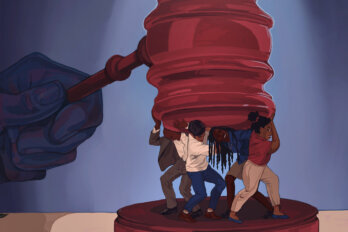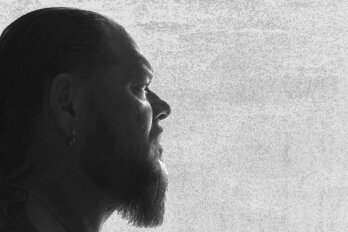This is the second instalment in a series about a criminal rape trial that took place in Toronto late last year. The trial lasted eight days; the judge announced his verdict earlier this month.
At the time of the actions that led to the criminal charges, the female accuser was seventeen years old, entering her final year of study at a Toronto high school. The male defendant was a year older, a star athlete on his way to winning a scholarship to a US college. She had substantial credibility problems on the witness stand. His testimony seemed far more convincing—at least at first. But this was more than just a “she said, he said”—or, as it turned out, “she lied, he lied”—case. There was an element of physical evidence against him: bruises on her arms and legs. The judge had to decide if the totality of the prosecutors’ case against the defendant was enough to send him to jail, brand him a sexual offender, and destroy his promising future.
Despite its sensational nature, this was a case that never made headlines. What I observed during my reporting was the farthest thing from a Jian Ghomeshi courthouse scene, with mobs of press and police. I was the sole reporter at the superior court trial and, on most days, the only observer not directly related to the case. The mother and grandmother of the accused, whom I will call Matthew in the reports that follow, attended throughout the trial. The complainant, who will be known as Ava, was supported by a representative from victim services and the detective in charge of her case.
Ava’s family and Matthew’s father were not permitted in the courtroom as they were all considered to be potential witnesses. They spent much of their time in the courthouse hallways, pacing or sitting nervously. Like everyone else, they knew that the events unfolding on the other side of the courtroom door would deeply affect the two young people involved for their entire lives.
—Ann Brocklehurst
The accused, Matthew, has a two-lawyer defence team: Carolyne Kerr, a former Crown attorney who used to prosecute rape cases; and Gary Stortini, a veteran criminal defence attorney with a grandfatherly air—he reminds me of Matlock. It is Stortini who cross-examines the complainant, Ava, about her August 2, 2012 encounter with the accused, Matthew. It’s the incident that led to this trial. (Her version was the subject of Part 1 of this series, She Said.)
“I am going to ask you to bring your mind back to 2012,” says Stortini, as he sets out to take apart Ava’s statement to the police—a videotaped interview that seemed highly believable to me a few days earlier, when I watched it in this courtroom.
Things go wonky right from the beginning. Under oath, Ava denies having originally met Matthew at a school dance that took place more than two years before the alleged assault—as I’d heard her tell the police in her recorded statement. Stortini reminds her of the contradiction.
He then suggests that when the two met again in June 2012, it was she who made first contact with Matthew over Facebook—not the other way around, as she’d told the police. Stortini implies that she might have done this (reached out to a young man whom she’d never met) after losing a significant amount of weight.
“How tall are you? ” he asks.
“Five-foot-five,” she answers.
“How much did you weigh? You were heavier.”
“Now? One-twenty.”
“How much heavier were you [before you met Matthew]? ”
“I was 150.”
Ava begins weeping. Stortini turns to Ontario Superior Court Justice Gary Trotter, who is presiding over this trial. “It’s almost impossible to cross examine her in this state,” he says.
“Is weight relevant? ” asks the judge, before calling a brief recess. In tears, Ava races off the witness stand. Detective Brian Wookey, the Toronto Police Services officer in charge of her case, follows her out into the halls. Stortini exits the courtroom through the lawyers’ door—only to storm back in minutes later. Wookey follows on his heels. Stortini complains to the Crown about a conversation he has just overheard between the detective and the complainant.
“I’m not trying to influence her in any way. I’m just trying to calm her,” Wookey says, as he and Stortini—both men are more than six feet tall—raise their voices at each other.
The argument ends when the detective apologizes to the attorney. It’s unclear why it began in the first place.
By the time Justice Trotter returns, the ill feelings seem to have subsided. Stortini resumes his questioning, asking Ava why she is trying to give the impression that Matthew initiated contact between them, when it was instead the other way around.
“False,” she says.
“Would you like to look? ” he asks, as he points to the transcript he has just given her. It’s from a preliminary inquiry held one year ago.
Ava turns away.
“You have to look at [it], even if you don’t want to,” says Stortini.
“You’re right,” interjects the judge, “but you did ask her if she wanted to.”
Stortini nods, then reads from the transcript. It’s a passage from Ava’s testimony. “Question: Back in June 2012, did you initiate [Facebook] contact? Answer: In the beginning, yes.”
He looks at Ava and asks, “So you initiated contact? ”
“Yes,” she says. It is one of many shifts she will make over the next three days of this trial.
Stortini asks Ava if she did this because she was interested in Matthew.
“Why would I be interested in a guy who’s in a different country? ” she says, alluding to the fact that by the spring of 2012, Matthew had left Toronto to attend an American prep school. “That makes no sense.”
Stortini broaches Ava and Matthew’s first in-person meeting of 2012. “You were attracted to him? ” he asks.
“I’m sorry—I could not like or be attracted to a guy I just met for two hours,” Ava responds, as if he is talking nonsense.
The lawyer turns away from the witness stand. He raises his eyebrows as he walks back to his podium.
Stortini and Ava have starkly different accounts of this encounter. He says she and the accused drove to a school parking lot—the same location where the alleged assault would take place months later—got out of Matthew’s vehicle, and walked around an adjoining park. They talked, briefly got to know each other, then returned to the lot and had sex in his back seat.
“That never happened,” the complainant cries on the stand. “That never happened.”
In her version, the pair instead went to Tim Horton’s for coffee.
“How long? ” asks Stortini.
“Five minutes.”
“Drive through or sit down? ”
“We got a coffee and walked.”
“What did he do with his car . . . where did you walk to?”
Ava asks for a break.
Justice Trotter, who has been kind and accommodating to her up to this point, reminds the witness that he’s in the middle, not on either side. “All of the questions asked have been proper,” he says. “They’ve been put in a polite and professional manner.”
The judge calls a lunch break. When we return, Stortini continues with his narrative, describing a young couple who met and immediately embarked on an intense sexual relationship. Ava consistently rejects his suggestions.
Matthew, his lawyer says, was busy juggling a full-time summer job and sports events in both Canada and the US. Ava, Stortini continues, had a lot more time on her hands. According to him, she quickly grew frustrated that Matthew didn’t have more time to spend with her.
The story Ava tells, on the other hand, is that she and Matthew were just friends for the first month after meeting each other. He meant nothing to her. Apart from the occasional hug, their interactions were entirely chaste. “I didn’t hound him,” she says. It’s the first time I hear her use an expression that she will repeat many times.
Stortini asks about a sports match of Matthew’s that Ava attended within the week when she met him. Her mother drove her there, and Matthew brought her home. On the way back, Stortini says, the pair stopped in a school parking lot and had sex in his back seat.
“No!” Ava cries. “Never happened.”
“You were on top.”
“It never happened. He took me straight home.”
“You left your panties behind.”
“No, I did not,” she says, pulling her hair back and weeping. She leaves the courtroom in a semi-hysterical state.
“This is very upsetting to the witness, obviously,” says the judge to the defence attorney. “But you have to do what you have to do.”
“I don’t feel comfortable not doing it,” says Stortini, noting that his persistence has already prompted Ava to change her story on certain events, including how she had met Matthew, and who initiated their contact in 2012.
When the trial resumes, Stortini picks up his thread. “On the way home [from Matthew’s game] . . . did you ask, ‘Where are we? ’”
“I wanted to know his intentions. I’d only seen him a couple of times.”
The lawyer says he finds it strange that Ava is maintaining they were nothing more than friends.
“I was just curious why, as a single girl, he had asked me to come to his game,” she explains. “What were his intentions? ”
“You didn’t care? ” Stortini asks her.
“I didn’t care . . . I had friends. It wasn’t me hounding him.”
Stortini moves on. He asks Ava about a time when Matthew visited at her home, and they went together to Swiss Chalet with several members of her family.
“Were you holding hands under the table? ” he asks.
“No,” she replies, as if this is a ludicrous suggestion. “We were eating. No, because my niece was there.”
Stortini asks about the couple going to see a late showing of The Amazing Spider-Man, more than a month after their first meet-up.
“Were you holding hands, eating popcorn, getting comfortable? ”
“No, we just put our feet on chairs.”
“So you weren’t being affectionate at all, correct? ”
“Yes. Correct.”
“Did you kiss him at home? ”
“I hugged him goodnight.”
Stortini describes still another encounter, a time when he says that Ava and Matthew returned to the spot where they first had sex—and where her alleged assault later took place.
“He came to your house, picked you up. You went to where you both knew it was safe . . . and you parked there.”
“No,” she insists.
“That didn’t happen? ”
“If we wanted to do that, we had my home when no one was [there]. No.”
Justice Trotter has already asked the defence attorney and the complainant to “give each other more space”: for him to let her finish her answers, and for her to let him finish his questions. After Stortini and Ava exchange a few more parries, the judge calls a halt to the session. “It’s been a long day,” he says.
[on-trial]



